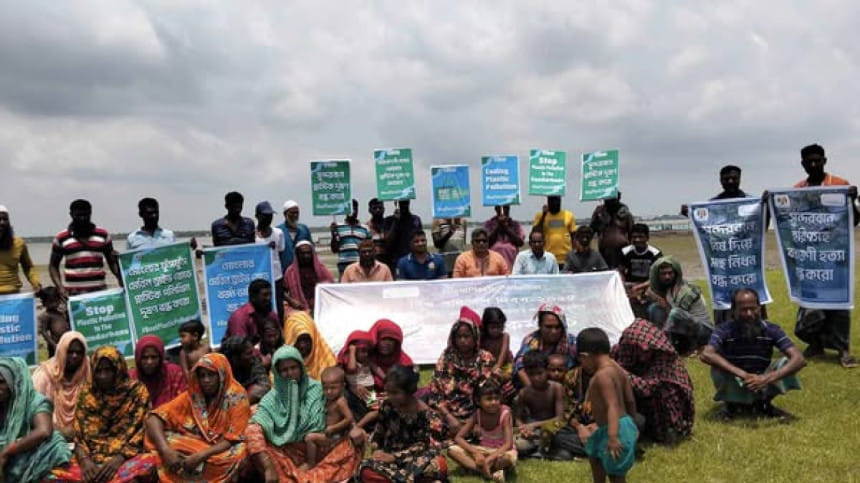Call for action as plastic waste threatens Sundarbans ecosystem

Pollution from plastic bottles, packaging, and polythene is steadily rising in the Sundarbans, threatening the delicate ecosystem of the world's largest mangrove forest and a UNESCO World Heritage Site.
Despite growing concerns, environmentalists say the government and Forest Department have shown little initiative to address the crisis.
The issue came to the fore today during a human chain and sit-in near Kanainagar village on the banks of the Pasur river, marking World Environment Day.
The programme was co-organised by Mongla Nagorik Shomaj and the Mongla Upazila Fishermen's Association.
Participants demanded an immediate end to plastic and polythene pollution in and around the Sundarbans.
Speakers pointed to studies that have already found microplastic particles in fish from the area, posing serious risks to public health.
They called on the government to implement a zero-tolerance policy on plastic and polythene waste to protect both aquatic life and the forest's biodiversity.
They also argued that restricting single-use plastics only within the Sundarbans would not be effective.
Instead, they urged a phased ban across the entire coastal region, leading eventually to a nationwide prohibition.
Among the speakers were environmental activist Mohammad Noor Alam Sheikh, Service Bangladesh President Mostafizur Rahman Milon, Mongla Nagorik Shomaj representatives Jane Alam Babu and Sumon Rana, Fishermen's Association General Secretary Abdur Rashid Howlader, along with Shahadat Bepari and Mohammad Zahid Hossain.
The programme was presided over by Bidyut Mondal, president of the Mongla Upazila Fishermen's Association, and attended by environmentalists from across the upazila.
"Every year, around 11 million tonnes of plastic waste enters aquatic environments, threatening biodiversity and human health," said Noor Alam .
"This plastic waste is causing severe damage to aquatic species, especially fish. Pollution has led to a decline in the size and health of Hilsa fish, and fish stocks in rivers adjacent to the Sundarbans are dwindling. The government must take a tougher stance to prevent plastic pollution and build an environmentally sustainable world," he said.

 For all latest news, follow The Daily Star's Google News channel.
For all latest news, follow The Daily Star's Google News channel. 



Comments